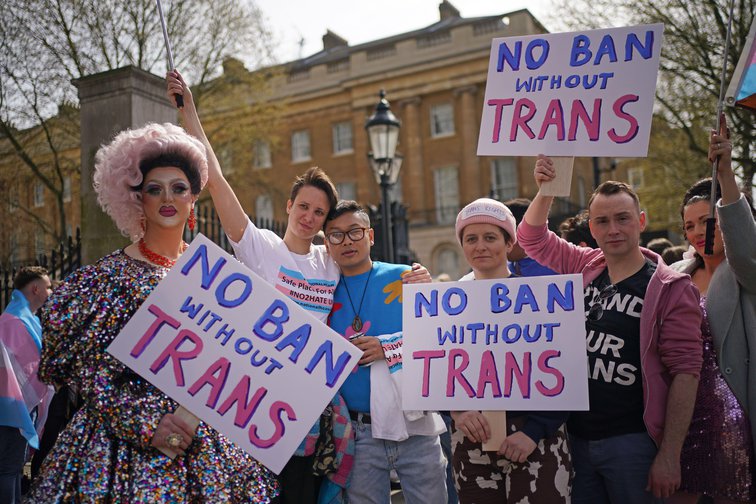In a recent op-ed for Dazed Digital, writer James Greig made the powerful point that, while homophobia and transphobia are often framed as two distinct forms of bigotry, they are linked more than we might think.
“It’s true that gay people do frequently get abused in the street for expressing intimacy with their partners in public, and that discrimination based on sexuality alone is still a big problem,” he wrote.
However, a significant proportion of homophobia relates to gender expression, Greig explained. “Just about every instance of homophobic abuse I’ve experienced has been occasioned by simply vibing in a way that was read as feminine […] It’s impossible to whip up fury against the trans community without this eventually backfiring on cis gay people.”
Of course, our reasons for protecting trans people shouldn’t be predicated on the risks posed to cis gays if we don’t. But it’s important to acknowledge the points at which homophobia and transphobia overlap – to correct arguments that frame trans rights and LGB rights as mutually exclusive projects.
Nonetheless, this narrative is taking hold in the government’s approach to a ban. In March, a leaked document revealed plans to scrap the legislation completely. Hours later, the government performed a partial U-turn, following intense backlash from MPs and ministers, charities including Stonewall, and members of the LGBTQIA+ community. It then said it would proceed with a ban, but would not include protections for trans people.
A petition for a trans-inclusive ban has since amassed more than 144,000 signatures, making it the third most-signed currently open petition. On 12 May, the government responded, pledging: “We will bring forward a ban that protects everyone from attempts to change their sexual orientation as soon as parliamentary time allows.”
However, it has not promised to include gender identity and expression. “There are different considerations when it comes to transgender conversion therapy and the Government remains committed to exploring these,” the response said. “One of the complexities is that those who experience gender dysphoria may seek talking therapy. It is vital that legitimate support is not inadvertently impacted.”
Loopholes for ‘consent’
The proposed ban will also allow over-18s to ‘consent’ to “non-physical” forms of conversion practices – as long as they do not cause “serious harm”. But NHS England and numerous expert bodies have described all forms of the practice as “harmful”.
“Healing [from conversion practices] is a lifelong project,” Ashley told openDemocracy. “I see a community that has lost the brilliance of so many people who went through conversion practices and did not survive – or doesn’t have the full brilliance and shine of people who were so deeply traumatised by conversion practices.
“It’s not this theoretical thing. It’s right there in my face; it’s in the tears of my friends when I hang out with them; it’s in my friends who wish they could do more in the community but have so much trauma, they just can’t.
“Survivors are, of course, the most impacted – but it’s also the very fabric of trans communities that is changed by conversion practices,” Ashley continued. “All these people that are abandoning trans communities have blood on their hands.”
Moreover, there is simply no such thing as “informed consent” in this context, LGBTQ+ advocates told openDemocracy. Anti-abuse charity Galop set up a helpline for survivors of conversion therapy. Many of the callers to the helpline supposedly ‘consented’ to what happened to them, said Leni Morris, Galop’s CEO – but they were not aware of the risks and severe psychological harm that the practice would cause.
“Conversion therapies nearly always take place within imbalanced power dynamics,” Morris explained. “Those who ‘consent’ to conversion therapies are often financially or emotionally dependent on those asking them to do so.”
“What is someone’s non-prejudiced reason for wanting conversion practices?” Ashley asked. “What’s the value of ‘consent’ when you have all of those pressures – both from the practitioner and/or your family, all of that internalised homophobia or transphobia? Without homophobia or transphobia, no one would be trying to undergo conversion practices.”
Providing so-called ‘consent’ does not prevent conversion practices from being harmful, they explained. “It doesn’t stop them from sending the message that being gay, trans or bi is wrong and less valuable. That’s just not something that is OK in a society that wants to establish equality and anti-discrimination as core principles.”



Comments
We encourage anyone to comment, please consult the oD commenting guidelines if you have any questions.